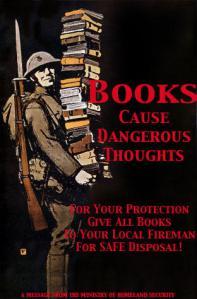You must understand that our civilization is so vast that we can’t have our minorities upset and stirred. Ask yourself, What do we want in this country above all? People want to be happy, isn’t that right?…Colored people don’t like Little Black Sambo. Burn it. White people don’t feel good about Uncle Tom’s Cabin. Burn it. Someone’s written a book on tobacco and cancer of the lungs? The cigarette people are weeping? Burn the book. Serenity, Montag. Peace, Montag. Take your fight outside. Better yet, to the incinerator. – Ray Bradbury, Fahrenheit 451
 Though Ray Bradbury was much more a fantasist than a writer of science fiction, in many ways his predictions about the society of the future have proven far more prescient than those of his contemporaries whose writings are more grounded in hard science. One striking example is his depiction of future homes and cities as being constantly inundated by music, synthetic voices and fast-changing video images from huge screens and loud speakers in every conceivable location; the TV screens which start playing commercials when one passes them in a store are straight out of Bradbury, as are the video players we carry in our pockets and the earbuds and bluetooth sets in our ears. Most science fiction writers depicted future people as being better-informed and more scientifically literate; Bradbury realized they would, if anything, be less so. And while typical 20th-century literary dystopias featured top-down censorship by totalitarian governments who wanted to wanted to keep their citizens in the dark for political reasons, Bradbury alone understood that the censorship of the future would be lateral, grass-roots efforts pushed by ignorant citizens who wanted to remain ignorant and unchallenged by ideas which unsettled them.
Though Ray Bradbury was much more a fantasist than a writer of science fiction, in many ways his predictions about the society of the future have proven far more prescient than those of his contemporaries whose writings are more grounded in hard science. One striking example is his depiction of future homes and cities as being constantly inundated by music, synthetic voices and fast-changing video images from huge screens and loud speakers in every conceivable location; the TV screens which start playing commercials when one passes them in a store are straight out of Bradbury, as are the video players we carry in our pockets and the earbuds and bluetooth sets in our ears. Most science fiction writers depicted future people as being better-informed and more scientifically literate; Bradbury realized they would, if anything, be less so. And while typical 20th-century literary dystopias featured top-down censorship by totalitarian governments who wanted to wanted to keep their citizens in the dark for political reasons, Bradbury alone understood that the censorship of the future would be lateral, grass-roots efforts pushed by ignorant citizens who wanted to remain ignorant and unchallenged by ideas which unsettled them.
We are living in the past of Fahrenheit 451, the early stages of a culture which values feelings above thought, the history of a world in which the solution to any troubling idea is to eradicate it. Right now it’s going on in the universities, where sheltered young people who have been coddled by overprotective parents for two decades are declaring themselves to be “triggered” or “offended” or even “violated” by ideas – whether spoken or in print – that they haven’t encountered before, or that contradict their opinions, or that they find unpleasant, or that bear some superficial resemblance to any of the preceding. Just as their parents “protected” them from these unpleasant thoughts by banning them from their homes with internet filters or “parental controls”, so they feel entitled to “protect” themselves – and every other person within their sphere of influence – from those bad, icky ideas by banning them. And just as they may have been shamed as children for “bad” thoughts, so they seek to shame others who originate such thoughts; sometimes these censors go beyond mere shaming to the desire to punish the Bad People, and often that punishment can be career-destroying or even life-wrecking.
But it’s not completely limited to universities, nor to insular corners of social media; as I wrote in last year’s essay for Banned Books Week (which in case you hadn’t figured it out from the topic, starts today):
…the urge to censor actually is [not]…limited to those traditionally labeled “social conservatives”…nowadays, the most belligerent, aggressive and effective proponents of censorship are those who…describe their targets with words like “sexist”, “racist”, “homophobic”, “objectifying”, etc…promoters of this chic form of censorship very often don’t call for the direct government suppression of their targets; that would, after all, be censorship, and every thinking person knows censorship is bad. So instead, they just “critique” the things they want banned and sling ad hominems like “misogynistic” at their targets’ creators, hoping to make them so radioactive in the public mind that risk-averse corporations will refuse to fund them…this isn’t technically censorship in the strictest traditional sense of the word, because it isn’t being forcibly executed by a political authority. Neither is Operation Choke Point direct criminalization of the businesses it targets; that doesn’t change the fact that those businesses are as effectively suppressed as if they had been criminalized…while [such methods] lack the violence associated with actual criminalization of forbidden ideas, they are still very effective in creating an intellectual soil highly toxic to free expression…
It doesn’t matter whether the excuse is “sin” or “feelings”, or the injured party is conceived of as an individual or collective, or the suppression comes from above or below, or the method is violence or economics; the suppression of thought and speech is evil, tyrannical and socially self-lobotomizing. As Ryan Holiday wrote in The Observer,
Your feelings are your problem, not mine—and vice versa. Real empowerment and respect is to see our fellow citizens…as adults. Human beings are not automatons—ruled by drives and triggers they cannot control. On the contrary, we have the ability to decide not to be offended. We have the ability to discern intent. We have the ability to separate someone else’s actions or provocation or ignorance from our own. This is the great evolution of consciousness—it’s what separates us from the animals…
Up until recently, Western society was built upon the premise that citizens were self-owning adults capable of self-determination and self-regulation, but as citizenship has been expanded over the last century and a half, the rights associated with it have been dramatically curtailed. As detailed exhaustively in this blog, modern governments believe they own citizens’ bodies and can control what we do with them to a terrifying degree; now our fellow citizens are trying to control what we can do with our minds. That is a two-pronged recipe for cultural suicide, and though it may be much too late to avert that, I consider it the duty of every freethinking, self-owning individual to do his or her best to at least go down fighting.
